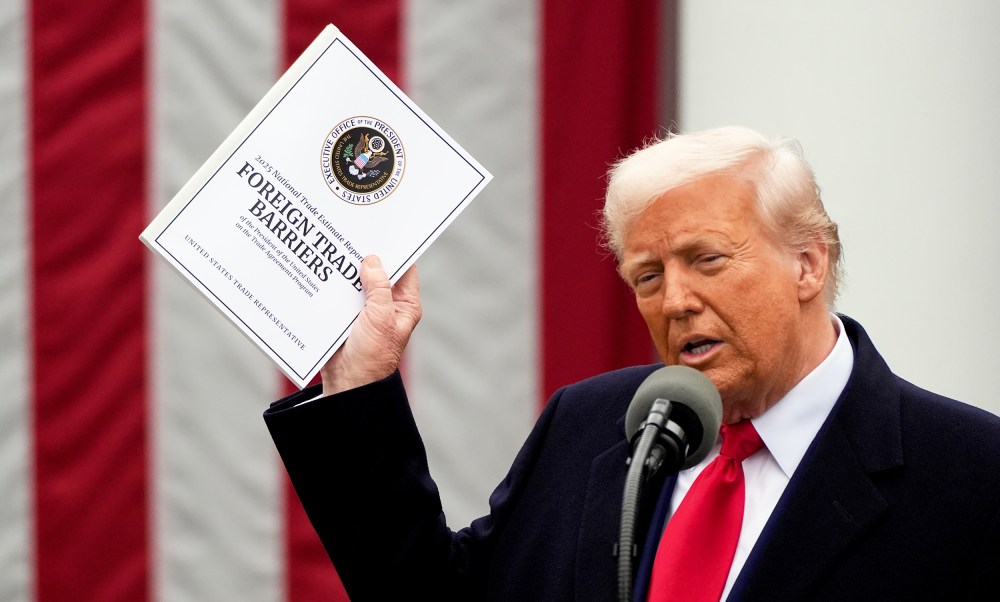When Oprah Winfrey asked Donald Trump about his approach to foreign policy on her show in 1988, the famed businessman said America’s allies should “pay their fair share.” Now, almost four decades later, that same conviction — that the U.S. has been taken advantage of by foreign partners — underpins the defining economic policy of Trump’s second term: a global tariff campaign that has unsettled markets and allies alike.
For a politician who has changed his stance on so many issues throughout the years, Trump has been remarkably consistent about tariffs. It is his favorite word in the dictionary, and “tariffs” have been his favorite tool to wield this year in pursuit of the U.S.’ most expansive global trade war in nearly a century.
And on Wednesday, the Supreme Court will hear oral argument in a case that could determine how much of that trade war may continue.

At issue is whether the White House exceeded its authority under the International Economic Emergency Powers Act, or IEEPA, when it imposed tariffs of 10% to 50% on dozens of countries. The administration invoked a national emergency over trade deficits — and later over the fentanyl crisis — to justify new levies on imports.
In other emergency cases this year, the Supreme Court has ruled on immediate actions with little to no explanation, often in favor of Trump. In this case, however, the judges called for oral argument and will review the case in full.
The decision, which may not come for months, offers a significant opening for the Supreme Court to define the extent of presidential power, particularly as a proxy to Congress’ constitutional authorities.
“The president was right when he said it’s one of the most important cases in American history,” Michael McConnell, who serves as the counsel-of-record for the plaintiffs in Wednesday’s case, told MSNBC. “If the president is able unilaterally to impose tariffs, why not other kinds of taxes?”
Trump previously flirted with attending Wednesday’s oral argument in person, which would have marked the first time a sitting president ever attended such a hearing, but he ruled it out over the weekend. Still, even the suggestion underscored how significant the president views the case.
“Tomorrow’s United States Supreme Court case is, literally, LIFE OR DEATH for our Country,” Trump wrote Tuesday on Truth Social. “Without it, we are virtually defenseless against other Countries who have, for years, taken advantage of us.”
Treasury Secretary Scott Bessent — a key player in tariff negotiations — will instead attend Wednesday’s proceedings, putting another recognizable figure in the room as justices probe both sides of the case.
The Trump administration argues the tariffs are essential to national security and domestic manufacturing.
“Are tariffs qualifying as the regulation of imports? Of course they are,” said Peter Navarro, a senior White House trade adviser, pointing to the IEEPA’s broad language allowing presidents to “regulate” importation and exportation. The administration’s opponents counter that the law never mentions the words “tariffs” or “tax” and that such powers belong exclusively to Congress.

The debate over the power to impose taxes and tariffs “goes all the way back to our colonial history,” according to Georgetown law professor Jennifer Hillman, evoking the Boston Tea Party protest that led to America’s independence.
“The taxing power belongs with the body that is the closest to the people: the Congress,” said Hillman, a former U.S. International Trade Commissioner who was involved in filing an amicus brief on behalf of 207 members of Congress. All lawmakers, except one, were Democrats.
The White House has asserted that its reciprocal and fentanyl tariffs are necessary to protect national security. Navarro told Fox Business in August that a dissent in a lower court ruling — which said the underlying statute contains broad enough language to imply tariff authority — could be “a very clear roadmap to how the Supreme Court can certainly rule in our favor.”
Navarro explained that the administration “never said” the tariffs were “permanent” after a federal appeals court struck down the reciprocal and fentanyl tariffs, writing that they were imposed for an “unlimited duration on nearly all goods from nearly every country in the world.”
Up to this point, Trump has faced several political tests to his trade policies. He paused his initial slate of global tariffs in April, on what his team dubbed “Liberation Day,” after facing pressure from Capitol Hill and Wall Street. The levies triggered a historic market sellout, but the president later imposed tariffs of similar value on most of the same countries.
Last week, in a rare series of bipartisan votes, four Senate Republicans joined Democrats to strike down the president’s tariffs, though the bills are unlikely to become law. Disputes with world leaders have frequently turned into heightened tariff threats from Trump, including over a negative TV ad about tariffs from Ontario and the prosecution of a former Brazilian leader Jair Bolsonaro. Some countries have retaliated against the duties, though cautiously and sparingly.
Small business owners, a key constituency who are among the plaintiffs in Wednesday’s case, have also asked the administration to change course. Even some of the president’s allies, including Sen. Ted Cruz, R-Texas, and Rep. Marjorie Taylor Greene, R-Ga., have expressed concern.
Cruz, on his increasingly popular podcast, called Trump’s tariffs the highest-risk political play “by far” of either of his two presidential terms.
“If we go into a recession, particularly a bad recession, 2026 in all likelihood politically would be a bloodbath,” Cruz said.












